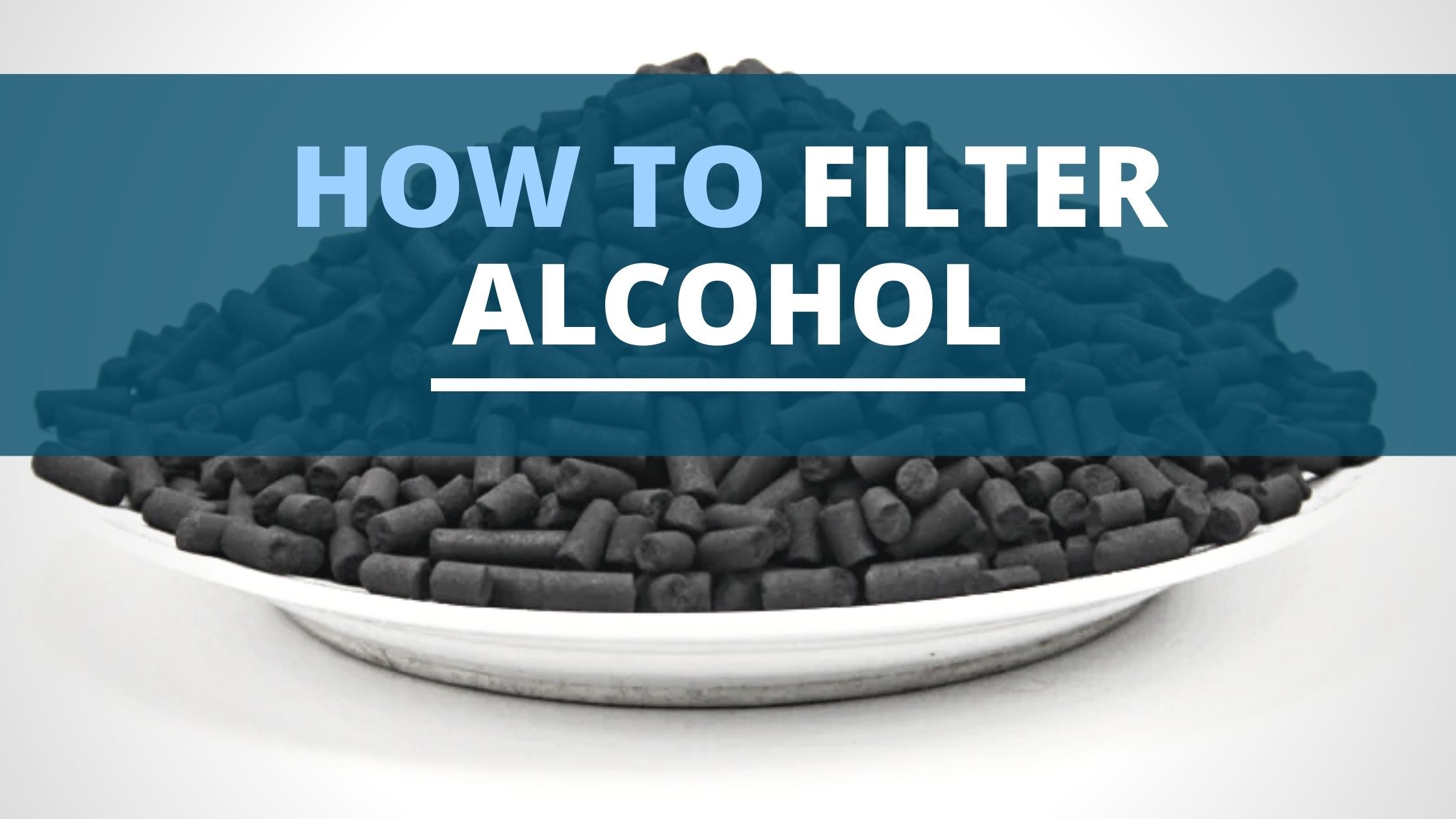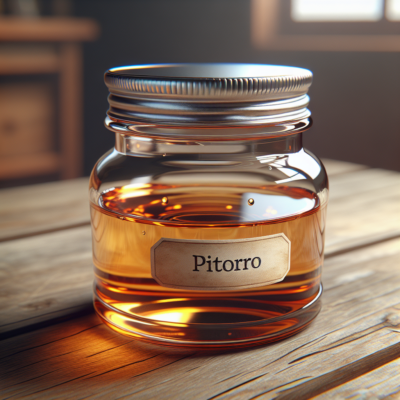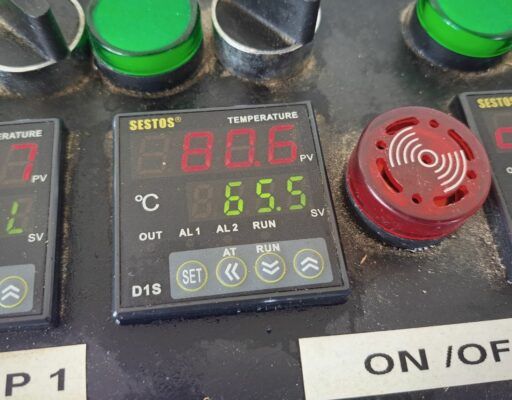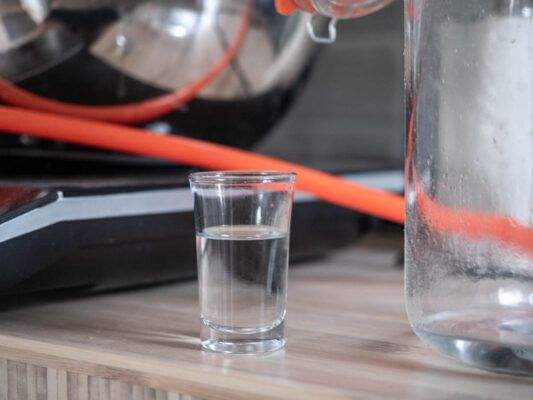Distilling 101, Filtering
How To Filter Alcohol (Is Carbon Filtering Worth It?)
Filtering of homemade spirits is about as polarising as politics. Some are adamant you have to, and others will tell you ‘it’s all a hoax‘. Even commercial spirits will advertise that they are “triple filtered” to bolster rapport.
So should you filter alcohol? Is it an essential step to producing a smooth drink or does it make a washed down, bland beverage?
Carbon filtering is worth it if you want to smoothen a rough spirit, clear the haze in your mead, or reduce the risk of bacterial growth. To filter homemade alcohol, pour wet activated carbon into a stainless steel filtering tube or funnel. Then, pour the spirit and allow it to flow through as slowly as possible so the carbon can trap and absorb the impurities you’re trying to get rid of.
As a new distiller, you’ll make some mistakes resulting in sharp-tasting and smelling alcohol. So, instead of discarding your spirit, filtering it might be the better route to take.
So, before you start to think filtering is taboo, carry on reading this post for instances that would warrant polishing your spirit.
Table of Contents
Do You Need To Filter Homemade Spirits? (Is Filtering Alcohol Necessary?)
Generally, filtering is done to achieve one or all of these things:
- When you want a smooth-tasting spirit – remove the harsh taste and flavor of the final product.
- To clear spirits – Like barrel haze in whiskey.
- To remove impurities – fusel oils.
But, it’s important to realise filtering is very much an ambulance at the bottom of a cliff.
Filtering should not be relied upon to compensate for poor distilling technique, bad washes, improppper cuts, etc. You should be able to make a good quality spirit with ZERO filtering.
What Is The Best Way To Filter Alcohol?
Here are the most common ways to filter alcohol.
1. Carbon filtering
Carbon filtering is the most widely used form of purifying spirits and uses activated carbon as a purifying medium. The carbon can be made from wood chips, peat, stone, bone, coconut- or a combination of these ingredients.
Carbon filtration is preferred because the carbon is porous enough to allow water and ethanol molecules to pass through, but compact enough to trap any impurities. It’s typically used to remove flavor and color from clear spirits like vodka and gin.
Read More: In this article we discuss our top 4 carbon filters for the beginner to the semi-pro!
2. Barrel Char Filtration
Barrel char filtration is used for barrel-aged spirits like whiskey. The oak used to age spirits is charred, and the carbon ash acts as a filter and imparts flavor to the alcohol. But remnants – fibers and particles, resulting from barrel aging remain so, this filtration method is employed to remove any of these sediments.
3. Particle Filtration
This process of filtration is often used after blending and diluting spirits. It effectively removes residues like sugar crystals in rum and particles in gin botanicals from an infusion. The particle filtration system is made of cellulose pads filled with activated carbon to produce a much clearer spirit.
4. Guard Filtration
Guard filtration is the last process of purifying a spirit before bottling. It ensures a shelf-stable, high-quality alcoholic beverage.
When Should You Filter Your Homemade Alcohol?
Here are instances when you should filter your homemade alcohol.
- When you want a super smooth vodka devoid of harsh flavor and taste.
- To correct for bad cuts such as too much heads in the final product.
- To remove particles from barrel-aged spirits like rum, or whiskey.
- To clarify any infused spirits or liquors like limoncello, infused gin, sloe gin etc.
NOTE: Filtering doesn’t remedy improperly run stills and wrong cuts. When distilling, always ensure you follow the instructions in the user’s manual for setting up and running the still and make proper cuts.
How To Filter Your Homemade Alcohol (Step-By-Step Guide)
Now that you have an idea of when you should filter homemade alcohol, here’s a step-by-step guide on how to filter it.
What you’ll need:
- 20×50 activated carbon filter
- Stainless steel funnel or 24″ filter tube
- 5-7 coffee filters – to slow down the flow of alcohol for the carbon to absorb impurities.
- Boiler or glass container
Preparing the filter
Before you filter your spirit, you’ll need to prepare (wet) the filter to remove carbon dust which can carry over and spoil your liquor. Here’s how to prepare your filter.
- Pour the carbon into a container and top it with water.
- Let it sit for 15 minutes.
- Pour out the water
- Repeat 3 more times.
Filtering your alcohol
- Place coffee filters at the end of the filter tube, and hold them in place with a hose clamp.
- Pour the carbon into the filter tube.
- Place it on the glass container, and pour about 500ml -1 liter of water to settle the carbon in place. Let the water drain through.
- Pour the spirit into the tube, and let the alcohol flow through.
Frequently Asked Questions
Q. What is the best way to filter moonshine?
The best way to filter moonshine is by using activated carbon. Its pores are fine enough to let water and alcohol pass through, but also impervious enough to absorb impurities. When using carbon as a filtering medium, ensure you give it several rinses to remove carbon dust which might carry over to your spirit.
Q. How do they filter vodka?
Vodka is filtered through activated carbon. Because vodka is a neutral spirit and should be odorless and flavorless, using carbon effectively removes flavor and aroma compounds. Some brands use diamond, silver, platinum, and gold filtration. Though some distillers argue the mention of this feature on shelved spirits is a marketing ploy, platinum, and silver are excellent purifiers.
Q. How do they filter whiskey?
Whiskey is filtered through chilled filtration. The alcohol is cooled between 5-10°C (41-50°F), sometimes as low as freezing temperatures. During the chilling process, haze-forming chemicals and fatty acid esters (FAE) flocculate – clump together, making it easier to separate them from the spirit during filtration.
Cellulose or paper filters are used to remove these compounds. The result is a clearer and smoother product.
Q. Is filtered alcohol better?
It depends on what we mean by better. If you’re making a spirit that can potentially develop bacterial growth – like fruit-based spirits, then filtering your alcohol is a surefire way to prevent any fungal surprises. Also, it does create an aesthetically appealing spirit – clears your moonshine.
But if you’re big on flavor, polishing might not be the best course of action. It does remove nastiness from your distillate, but it also strips some of the bolder, rounded flavors, resulting in a lighter and smoother drink. If you want to retain heaps of flavor, it’s best to run your alcohol through a clean still and make proper cuts.
Conclusion
When you attempt filtering and the outcome is to your liking, you’ll find there is no right or wrong when it comes to polishing your final product – it’s all about the situations that call for purifying. These include instances where you want to smoothen the edges of your spirit and clear your mead.
So, before you make a conclusive decision on whether or not to filter your spirit based on the downsides you’ve read about in other literature, why not try this process for yourself and see if you enjoy your final product?








